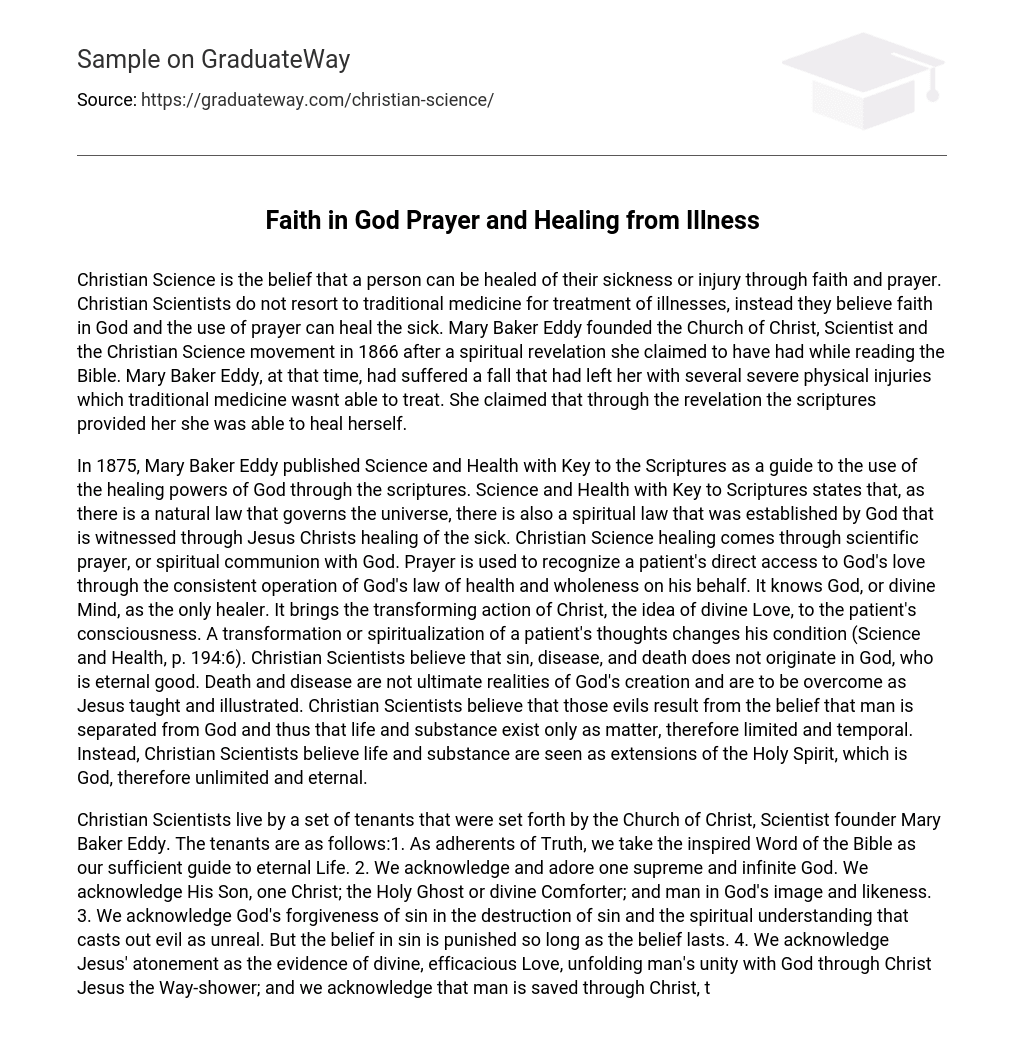Christian Science is the belief that a person can be healed of their sickness or injury through faith and prayer. Christian Scientists do not resort to traditional medicine for treatment of illnesses, instead they believe faith in God and the use of prayer can heal the sick. Mary Baker Eddy founded the Church of Christ, Scientist and the Christian Science movement in 1866 after a spiritual revelation she claimed to have had while reading the Bible. Mary Baker Eddy, at that time, had suffered a fall that had left her with several severe physical injuries which traditional medicine wasnt able to treat. She claimed that through the revelation the scriptures provided her she was able to heal herself.
In 1875, Mary Baker Eddy published Science and Health with Key to the Scriptures as a guide to the use of the healing powers of God through the scriptures. Science and Health with Key to Scriptures states that, as there is a natural law that governs the universe, there is also a spiritual law that was established by God that is witnessed through Jesus Christs healing of the sick. Christian Science healing comes through scientific prayer, or spiritual communion with God. Prayer is used to recognize a patient’s direct access to God’s love through the consistent operation of God’s law of health and wholeness on his behalf. It knows God, or divine Mind, as the only healer. It brings the transforming action of Christ, the idea of divine Love, to the patient’s consciousness. A transformation or spiritualization of a patient’s thoughts changes his condition (Science and Health, p. 194:6). Christian Scientists believe that sin, disease, and death does not originate in God, who is eternal good. Death and disease are not ultimate realities of God’s creation and are to be overcome as Jesus taught and illustrated. Christian Scientists believe that those evils result from the belief that man is separated from God and thus that life and substance exist only as matter, therefore limited and temporal. Instead, Christian Scientists believe life and substance are seen as extensions of the Holy Spirit, which is God, therefore unlimited and eternal.
Christian Scientists live by a set of tenants that were set forth by the Church of Christ, Scientist founder Mary Baker Eddy. The tenants are as follows:1. As adherents of Truth, we take the inspired Word of the Bible as our sufficient guide to eternal Life. 2. We acknowledge and adore one supreme and infinite God. We acknowledge His Son, one Christ; the Holy Ghost or divine Comforter; and man in God’s image and likeness. 3. We acknowledge God’s forgiveness of sin in the destruction of sin and the spiritual understanding that casts out evil as unreal. But the belief in sin is punished so long as the belief lasts. 4. We acknowledge Jesus’ atonement as the evidence of divine, efficacious Love, unfolding man’s unity with God through Christ Jesus the Way-shower; and we acknowledge that man is saved through Christ, through Truth, Life, and Love as demonstrated by the Galilean Prophet in healing the sick and overcoming sin and death. 5. We acknowledge that the crucifixion of Jesus and his resurrection served to uplift faith to understand eternal Life, even the allness of Soul, Spirit, and the nothingness of matter. 6. And we solemnly promise to watch, and pray for that Mind to be in us which was also in Christ Jesus; to do unto others as we would have them do unto us; and to be merciful, just, and pure.
Christian Scientists claim that the practice of Christian Science does not involve hypnotism, spiritualism, or suggestion. It is not the control of one human mind over another, nor the exercise of human will or positive thinking. The practice of Christian Science supposedly employs no formulas, chants, or rituals, no esoteric practices or secret writings. Although they claim faith is an important element in the healing process, the healing process itself does not rest on blind belief, but on the ever-increasing understanding of the present perfection of God’s spiritual creation. Christian Scientists claim this is a practical and essential difference between Christian Science and what is generally considered faith healing today. Christian Scientists argue that they are not a cult and that they always have freedom of choice in caring for themselves and their families, just as anyone who normally resorts to medical care could choose to use spiritual means. When someone joins the Christian Science Church, he or she has determined to follow the Christian Science way of life. If an individual departs from the use of Christian Science by choosing some other kind of treatment, he or she is supposedly neither condemned by the Church nor dropped from membership. There are many differences in the beliefs of Christian Scientists as compared to traditional mainstream religion. For example, Christian Scientists do not practice traditional Christian sacraments such as communion or baptism, with what they claim as outward symbols or ceremony. To Christian Scientists, baptism means the daily, ongoing purification of thought and deed and not an actual event. Eucharist is spiritual communion with God, celebrated by Christian Scientists through silent prayer and Christian living. While Christian Scientists do believe in an existence after death, they do not believe in Heaven and hell as specific destinations one reaches after death, but as states of thought, experienced in varying degrees here and now, as well as after death. BibliographyEddy, Mary Baker. 1875. Science and Health, with Key to the Scriptures. Christian ScienceBraden, Charles S. 1958. Christian Science Today: Power, Policy, Practice. SMU Mead, Frank S. 1985. Handbook of Denominations in the United States. Abingdon, 8th ed.
Comptons Interactive Encyclopedia, 1997.





